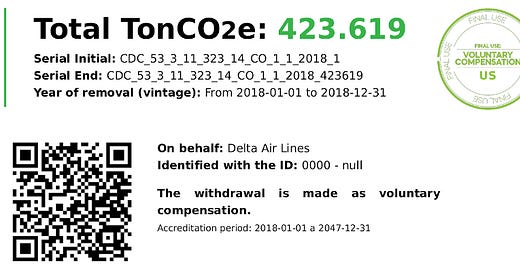Colombia’s Constitutional Court rules in favour of Indigenous Peoples. Identifies serious flaws in the REDD+ Baka Rokarire project
Indigenous communities accused Masbosques, Ruby Canyon Environmental, and Cercarbono of failing to respect their rights.

In December 2023, REDD-Monitor wrote about the REDD+ Baka Rokarire project in the department of Vaupés, in Colombia. The project covers an area of more than 715,000 hectares and the project developer is a Colombian public-private forest management company called Masbosques.
But Fabio Valencia, an Indigenous leader in the project area told Agence France Presse that the project is destroying his people. The project was taking control from the region’s Indigenous leadership and had split the community between those in favour of the project because of the cash payments, and those against it.
“This contaminates spirituality, physically, it destroys everything . . . in this territory for money,” Valencia told AFP.
The Indigenous communities only found out about the REDD project on 11 April 2022, more than one year after the project started.
They wrote to the companies involved in the project, Masbosques, Ruby Canyon Environmental, and Cercarbono, demanding, “the non-commercialisation of the carbon credits issued in the Baka Rokarire Project, as well as the cancellation of all actions, activities, procedures, documents and other generated with said initiative, because our fundamental rights have been violated.”
The tutela action
In July 2022, the Pirá Paraná Indigenous Council and the Association of Indigenous Traditional Authorities of river Pirá Paraná (ACAIPI) filed a tutela action arguing that the project is “seriously violating our fundamental rights to cultural integrity, self-determination, self-government and territory”.
A tutela action is available to anyone in Colombia who believes their constitutional rights have been violated or threatened, under the country’s 1991 Constitution.
But the judge rejected the Pirá Paraná Indigenous communities’ arguments arguing that tutela action was not the correct legal mechanism and there are other judicial mechanisms to challenge the REDD project. Following an appeal, the Administrative Tribunal upheld the judge’s decision.
But on 28 April 2023, the Colombian Constitutional Court selected this case for review.
Constitutional Court decision
On 25 June 2024, the Constitutional Court upheld the legal complaint. The Court’s decision states that,
The Court concluded that the defendant companies failed to act with due diligence to respect the rights of the indigenous population and to prevent their own activities from causing or contributing to negative consequences of their operations. The Court found that the companies: (i) did not adapt their legal instruments to international and national human rights standards, (ii) did not obtain genuine free, prior and informed consent from this indigenous population, and (iii) did not carry out effective monitoring or adopt adequate measures to address the demonstrated impacts.
The Constitutional Court also decided to reverse the lower court rulings and decided “instead to uphold the rights to self-determination, autonomy, self-government, territory, identity, physical and cultural integrity, and free, prior and informed consent of the indigenous communities”.
The Court ruling invites the Indigenous communities of Pira Paraná to meet within three months, without “interference from third parties or persons outside their people” to decide whether to implement a current or future REDD project in their territory.
Within three months, the Indigenous communities are to decide whether the REDD+ Baka Rokarire project will continue or not. The companies involved in the REDD project must not intervene, or attempt to influence the Indigenous communities’ decision-making.
The Court rules that if there is no decision from the communities after six months on how to implement a REDD project on their territory, “it will be understood that they do not consent to continue with the execution of the REDD+ Baka Rokarire project, or any other REDD initiative”.
Fossil fuels and Delta Air Lines
While the Court decision is a clear victory for the Indigenous communities in Pirá Paraná, the Court did not completely reject REDD. It argues that REDD is a “viable option for sustainable forest management” and “the governance of Indigenous communities”.
But the Court decision adds that,
[T]here are particular challenges and circumstances that result in a deficit in the protection of rights collectives of these communities and unconstitutional practices that make their unique needs and circumstances invisible.
The Court decision stresses the importance of initiatives to mitigate greenhouse gases, and includes REDD in these initiatives.
But the Court did not consider whether carbon trading mechanisms actually reduce greenhouse gas emissions. They don’t. For every carbon credit sold from a REDD project, one tonne of pollution from burning fossil fuels is emitted somewhere else.
The Court’s decision makes no mention of fossil fuels. Neither did it make any mention of Delta Air Lines — the Big Polluter that is the only buyer of REDD+ Baka Rokaire carbon credits.
In September 2022, Delta Air Lines retired 1.3 million carbon credits from the REDD+ Baka Rokaire project.
Delta Air Lines faces a lawsuit in the US about its claims to be “carbon neutral”.
Delta’s “carbon neutral” claims, are, predictably enough, based on Delta’s purchases of carbon credits. In addition to the carbon credits from the REDD+ Baka Rokaire project, Delta has bought carbon credits from the Cordillera Azul National Park REDD project in Peru, the Portel REDD projects in Brazil, and the Florestal Santa Maria REDD project in Brazil.







That is a great quote: "This contaminates spirituality, physically, it destroys everything ... in this territory for money,” Valencia told AFP.
(dividing the community between those seeking to milk the {often imaginary} cash cow, and those who value their relationship to their home and land.)
Why should REDD be considered an option for "governance of Indigenous communities"? That is a new twist in events.